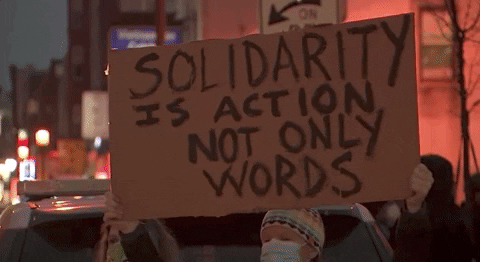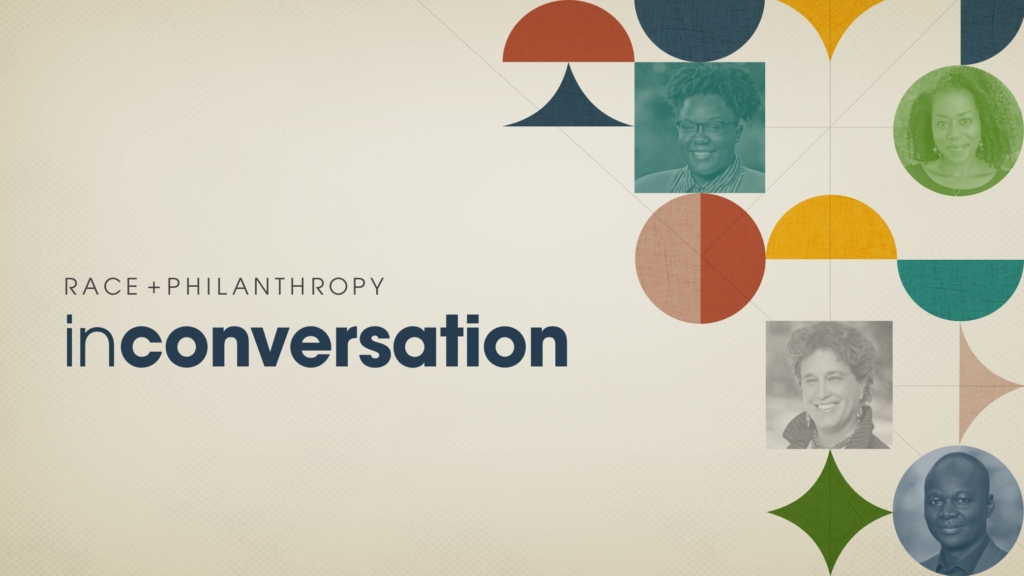Highlights
- Let’s get radical
- Politics, violence and climate governance
- Hiding in plain sight
- Counter offers
- It takes action, not just words
- TAI Spotlight: Candid conversations about race in our lives and in our work in philanthropy
Let’s get radical

Image Credit: Harry Haysom via Financial Times
It’s Open Gov Week! So, seems appropriate that seemingly every day events reveal a new issue where transparency and accountability are important to securing better outcomes. Cryptocurrency just the latest with rising concerns about dependence on fossil fuel driven data mining and lack of money laundering controls both pointing to the need for more scrutiny.
What of radical transparency to help vaccinate the world? Gillian Tett makes the case as the World Bank is looking to create a database of all vaccine orders that can help address imbalances in supply and price. Will Big Pharma agree to provide the necessary data?
Staying with the pandemic, Patralekha Chatterjee takes a look at the accountability crisis behind India’s Covid-19 surge, noting that while the medical disaster is perhaps the most visible element of the crisis, it is by no means the only one.
What of safeguarding democracy? In Georgia and Ukraine, public opinion research points to the critical role of good governance in countering disinformation, safeguarding democracy, and building resilience. Yet, mixed messaging in Ethiopia where Afrobarometer survey data reveals that most Ethiopians (77%) want the media to report on government mistakes and corruption, but almost half (48%) also say the government should have the right to prevent the publication of things it disapproves of.
Talking of governments clamping down, the E.U.’s proposed Digital Services Act is seen by critics as a potential way for authoritarian governments to suppress free speech. Iverna McGowan warns that the E.U. must ensure the Act does not silence vital work that journalists and human rights defenders do to protect democracies.
Set on the transformative power of artificial intelligence? First read this new framework for investing in AI for good. Prerequisite reading for funders, policy makers, and civil servants alike.
Talking of civil servants, Samuel Sharp, Stacey Young, Yuen Yuen Ang, and Toby Lowe share insights on building better adaptive bureaucracies through adaptive management (a nice build on last week’s featured story on learnings of three years of UK adaptive programming). Civil servants can also take advantage of a tailored access to information guide courtesy of Twaweza.
Politics, violence, and climate governance
How to boost climate governance? Tamar Eisen and Molly Middlehurst ask democracy and governance organizations to prioritize women’s political leadership to ensure inclusive environmental governance and political processes. The Inter-American Development Bank (IDB), and its private arm IDB Invest, turn to a more technical approach, launching a new tool to increase the transparency of the Latin American and Caribbean green bond market.
Don’t forget the power of advocates to drive change, too. Congrats to those involved in the campaign to end UK support to fossil fuel projects around the world. Their recent success has won them the David and Goliath award from Sheila McKechnie Foundation.
Communities in Roraima, Brazil could do with support. Soaring gold prices have triggered incursions by illegal miners and attacks against Yanomami Indigenous people yet over in the Brazilian capital, the Lower House voted to exempt environmental impact assessments and licensing for development projects.
Recognizing such dynamics at play, the Extractive Industries Transparency Initiative (EITI) examines how fossil fuel producers may hinder energy transition in their own countries – concluding that the proof is in politics. EITI head, Mark Robinson, reflects on working politically in the sphere of natural resource governance. “Almost two decades of experience of EITI implementation show that political factors influence its success in at least three ways. They shape government commitment, influence the pace and depth of implementation, and drive access to information to foster public debate.”
The European Commission hosted an event to examine extractives transparency in a post-COVID world, extractive stakeholders from Francophone Africa discussed and debated the role of the EITI in mitigating corruption, the Transparency International Accountable Mining Programme examines the impacts of COVID on corruption risks in the licensing of large-scale mining projects, and the Balomiti community in South Africa show exactly how those risks have played out locally.
TPA Full Disclosure: Mario Picon on the power of collaboration to combat corruption through TPA
![]()
Born and raised in Lima, Peru, Mario Picon’s initial career plan was to be a macroeconomist and financial programming expert, but a series of field experiences in the Amazon area and the Andes sent him in a different direction, and he has never looked back. Today, he serves as the Program Director of the Leveraging Transparency to Reduce Corruption initiative at Results for Development. We sat with Mario to discuss the power of collaboration in the transparency, participation, and accountability field and how such collaboration helps to build promising strategies and sets of solution to combat corruption.
Hiding in plain sight
Britain currently plays a central role in global illicit financial flows. Alex Jacobs of the Joffe Trust outlines an agenda for change to ensure financial integrity. UK Anti-Corruption Coalition also laid out a 6 point agenda to fight corruption in the UK this year, ranging from economic crime to democratic standards. But is the UK government listening? It does at least seem keen to keep the US happy by aligning sanctions efforts.
What can UK complicity look like? Oft-illicit wealth finds a ready home. A Carnegie Endowment for International Peace report points to the British education sector as an attractive way elites move illicit funds offshore under the guise of educating children in elite schools.
Not that the US should feel complacent. The US Financial Crimes Enforcement Network recently got a budget boost, but can it really solve America’s money laundering problem? Peter Stone takes a deep dive into how the U.S. became the money laundering capital of the world and argues that America’s entire approach to money laundering needs a radical rethink.
Lynsey Chutel adds to drip drip of calls to tackle enabling of corruption by western companies. This time with an expose of their role in Angola. In Democratic Republic of Congo (DRC), a coalition of Congolese and international organizations [#CongoIsNotForSale] claims the DRC lost nearly $2bn in revenue by selling mining and oil assets to Israeli tycoon Dan Gertler.
Meanwhile, former South African President, Jacob Zuma, finally appears in court on corruption charges 16 years after he was accused of accepting bribes from French weapons manufacturer Thales.
Essential Listening: How ‘Access Money’ Corruption Boosts and Threatens China’s Growth with Yuen Yuen Ang

Political scientist, China scholar, and political science professor, Yuen Yuen Ang provides an expert’s guide to how corruption has supercharged and complicated China’s blistering rate of economic growth.
Counter-offers
Abebe Aemro Selassie and Andrew Tiffin examine the consequence of COVID-19 on African nations, identifying three conflicting policy goals Africa finance ministers will have to navigate in the pandemic recovery – reduce taxes, increase spending, reduce debt. In this context, assuring some benefit from pending global tax reforms would be a boon. So, encouraging to see the African Tax Administration Forum submit a proposal to the OECD for a simplified version of the current U.S. proposals for digital tax reform that would be more easily administrable by developing countries. Will they be listened to? Perhaps the retention of their own digital service taxes during negotiations can provide some leverage.
Staying with the reform debate, Mike Durst discusses how the U.S. minimum tax proposal galvanises debate on corporate taxation in countries rich and poor while Abdul Muheet Chowdhary suggests ways to make the UN tax committee more effective for developing countries. Abimbola AbdurRahman Lekki lays out the challenges of digitalizing taxation in Nigeria and offers some recommendations.
Finally, tax regulators might want to check out this free book Oxford University Press on combating fiscal fraud, while 100 civil society organizations, hundreds of small businesses, and scores of investors are pushing for greater tax transparency in the US by supporting the Disclosure of Tax Havens and Offshoring Act. In a positive sign of the times, investors with around $3 trillion in assets under management have come out in support.
It takes action, not just words

Leonora Buckland and Lisa Hehenberger write on the importance of impact evidence as a learning tool, adding that social enterprises and nonprofit organizations need to change the way they measure the impact of their work and become learning organizations so they can influence public policy. Perhaps pair with Lance Pritchett’s latest foray into the debate over randomized controlled trials and his call to look at all evidence available.
Laudes Foundation has been asking “How can we measure and learn when promoting systems change?” If you’ve not seen it, check out their resulting rubrics-based methodology to help understand contributions to change, while learning and adapting to new and unforeseen circumstances. On the other hand, Mulago Starr on how scalable solutions can be more effective than systems change.
Brenda Solorzano calls on fellow funders to bring trust-based practice and culture into philanthropy systems rather than creating harm under the guise of compliance. Pair with Edge funder’s piece on the importance of building trust, collaboration and relationship within philanthropic organizations to achieve social justice as Samantha Wright, Annie Neimand, and Max Steinman share insights on how to deploy an effective trusted messenger strategy in different contexts.
Kudos to TAI member Hewlett Foundation for thoughtful approach and sharing to collecting/reflecting on grantee demographic data (interesting to compare with MacArthur’s similar effort). Both examined US grantee data only, so a fascinating challenge ahead to appropriately extend such data gathering and analysis to international grantees.
Staying with our own membership to end, the Chronicle of Philanthropy highlights some massive changes in the OSF family of foundations, including a return to the core idea of fighting authoritarianism and building civil society bulwarks.
TAI Spotlight: Candid conversations about race in our lives and in our work in philanthropy

Candid conversations about race in our lives and in our work in philanthropy | Hewlett Foundation
The foundation launched a new series featuring conversations with Hewlett Foundation staff, alumni, and partners to discuss race in grantmaking, what they’re learning, thinking, and doing at the foundation and in the fields. Check out Althea Anderson and Joseph Asunka’s reflections on power, equity and race in international giving as a black funder as well as Jasmine Sudarkasa and Fay Twersky’s conversation on the process and their experience behind the anti-racism grants that the foundation announced last year.
Why we need to redefine care | Ford Foundation
Ford and seven other foundations (including TAI member, Open Society Foundations) launched the care fund to invest $50 million over 5 years in movement-building for a universal, publicly supported care infrastructure in America. Check out this visual story of impact by Sarita Gupta which examines the history and future of the care movement.
How independent agencies can begin to hold police accountable | Open Society Foundations
Masha Lisitsyna and Ian Scott writes on how some countries are building independent, civilian-run agencies that investigate police violence.
Features of effective systemic foresight in governments globally | UK FCDO
Which governments were able to integrate foresight systematically in policy making? The School of International Futures (SOIF) provide a framework for governments to build and sustain foresight in policy-making, drawing on 8 country case studies.
Job Listings
- Managing Director of Finance and Operations at Global Integrity – (Early application encouraged) Position starts May 24
- Finance & Compliance Manager (part time) at Integrity Action – May 26, 2021
- Postdoctoral Associate, Political Science-MIT Governance Lab (MIT GOV/LAB) – May 31, 2021
- Open Data Charter, Executive Director – June 7, 2021
- Consultancy – evaluation and student material development at Integrity Action – June 13, 2021
- Job postings at Hewlett Foundation – Ongoing
- Job postings at MacArthur Foundation – Ongoing
- Job postings at Open Society Foundations – Ongoing
- Job postings at Luminate – Ongoing
- Job postings at Ford Foundation– Ongoing
- Job postings at FCDO – Ongoing
Calls/Opportunities
- Call for papers: National Tax Association conference – May 31, 2021
- West Africa Civil Society Institute (WACSI) call for papers and articles – Open year-round
- USAID’s Development Innovation Ventures (DIV) grant funding– Ongoing
- Call for research proposals Tax and civil society – No Deadline
- Free Digital Security Training– Ongoing
- Call for proposals: Informality, tax, and the state– Proposals accepted on a rolling basis
Calendar
- Open Gov week (Virtual) – May 17-21, 2021
- High-level discussion on beneficial ownership transparency in Africa – May 19, 2021 (12:00 Abidjan / 14:00 Johannesburg / 15:00 Nairobi / 8:00 AM EDT)
- Beneficial Ownership transparency in Africa webinar series – May 19-20, 2021
- Philanthropy and the new economy – May 20, 2021
- Remaking the economy: Core elements of system change – May 20, 2021 (2:00 pm EDT)
- Open Ownership webinars on Beneficial ownership transparency in Africa – May 20-21, 2021
- Empowering communities using geospatial technology – May 25, 2021 (10:00 EST)
- ITAD at UKES 2021: Evaluation and evaluative thinking –May 25-27, 2021
- #ShiftThePower: What power and how far has it shifted? – May 27, 2021 (15:00 – 16:00 BST)
- IFTF Foresight Talks: Bringing Strategic Foresight to the U.S. Government – May 27, 2021 (9AM Pacific Time)
- Hidden but with a high cost: What is at stake with supplier transparency? – May 27, 2021 (14:00 – 15:00 CEST)
- Lie machines: How disinformation threatens democracy and how to save it –June 10, 2020 (11:00 am – 12:00 pm)
- Time for a Climate Revolution – June 16-17, 2021 (5pm BST / 12pm EST / 9am PST)
- Global Investigative Journalism conference – November 3-5, 2021
- National Tax Association conference – November 18-20, 2021


